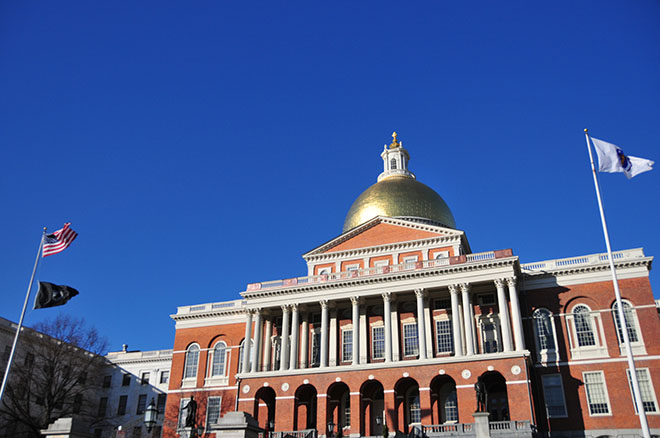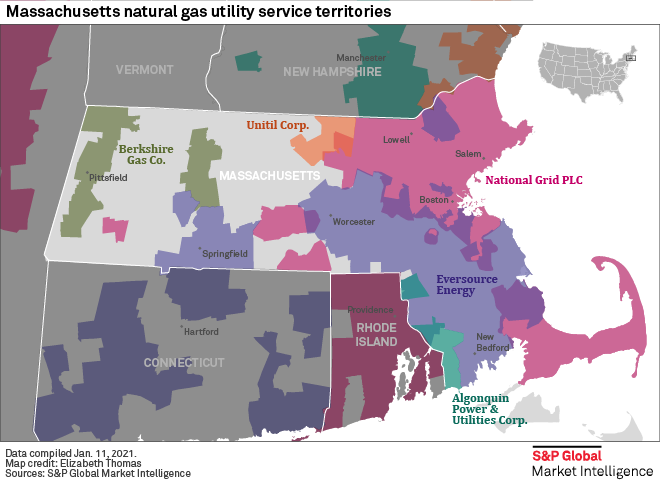Featured Topics
Featured Products
Events
S&P Global Offerings
Featured Topics
Featured Products
Events
S&P Global Offerings
Featured Topics
Featured Products
Events
S&P Global Offerings
Featured Topics
Featured Products
Events
Financial and Market intelligence
Fundamental & Alternative Datasets
Government & Defense
Professional Services
Banking & Capital Markets
Economy & Finance
Energy Transition & Sustainability
Technology & Innovation
Podcasts & Newsletters
Financial and Market intelligence
Fundamental & Alternative Datasets
Government & Defense
Professional Services
Banking & Capital Markets
Economy & Finance
Energy Transition & Sustainability
Technology & Innovation
Podcasts & Newsletters
3 Feb, 2022

|
A grassroots movement to restrict natural gas use in new buildings has percolated up to the Massachusetts State House. |
Massachusetts state lawmakers are taking steps to support a long-running campaign to allow local governments to pass building gas bans, reflecting the legislators' concern about Republican Gov. Charlie Baker's position on the grassroots movement.
Democrats in the state legislature advanced legislation that would give any Bay State town or city the authority to require all-electric construction in new buildings and major renovations. The lawmakers also kept complementary legislation in play as they seek clarity on a key building decarbonization policy from the Baker administration.
The move is the latest development in a years-long building electrification movement in Massachusetts, where state utility law preempts towns and cities from restricting access to gas utility service. Early in 2021, Baker and legislators reached an agreement on the issue while negotiating the state's climate policy roadmap. The law directed the Massachusetts Department of Energy Resources to design an optional energy code for construction, available to local governments seeking to go beyond minimum energy efficiency requirements.
From the start, grassroots organizers and local officials worried that the code would not give them explicit authority to prohibit gas combustion in new buildings and renovations. The stakeholders now worry that fear was warranted, pointing to the Baker administration's failure to produce a draft code by fall 2021 as intended.
"The legislation became effective after 90 days in June of 2021, and yet no hearings have been held, no language has been drafted and no schedule has been established for meeting the statutory mandate that the code will be finished by next December," Arlington Town Manager Adam Chapdelaine said during a Jan. 19 hearing.
The Baker administration did not respond prior to publication to questions regarding its work on the code.
Democrats create contingency plan
The administration's delay, and reports that developers are seeking to weaken the code, prompted the Massachusetts legislature's Joint Committee on Telecommunications, Utilities and Energy to hold the Jan. 19 hearing to consider a suite of building electrification bills that could backstop the state's executive branch.
"To reach our climate goals, we need to begin constructing buildings that do not rely on fossil fuels for heating," committee co-chairs Sen. Mike Barrett and Rep. Jeff Roy said in a Jan. 18 statement. "On the off chance that the stretch energy code either does not emerge soon or emerges but departs from legislative intent, we're looking at contingency steps the Legislature may want to take."

During the week of Jan. 30, the joint committee gave the legislature an option by sending Senate Bill 1333 to the state Senate Ways and Means Committee with a favorable recommendation. The bill would amend state law to allow towns and cities to require all-electric space and water heating, cooking, and clothes drying — and to prohibit on-site fossil fuel infrastructure — in construction and major renovations.
Additionally, the joint committee attached several related bills to an extension order, which would keep them under consideration in the committee, pending House and Senate approval. Those included petitions for special authority from several towns to restrict gas use, one of several strategies developed by local activists after the Massachusetts attorney general struck down Massachusetts' first gas ban.
During the Jan. 19 hearing, legislators, local officials and organizers said granting the authority would allow several municipalities to serve as policy labs. In addition to fine-tuning the policy, cities and towns could help build the market for electric heating alternatives, expand the clean energy workforce and boost consumer awareness, making the transition easier for other communities, said Sen. Cynthia Stone Creem, who sponsored a petition for authority from Brookline, Mass.
"Maybe we're not ready statewide in 2022 to pass a law, but these communities are ready, so we ought to let these communities take that leadership role and demonstrate what can be done," said Rep. Tommy Vitolo, who represents Brookline and co-developed the opt-in stretch energy code in the 2021 legislation.
Stakeholders debate housing costs
Lawmakers and stakeholders also expressed the view that the building industry and unions were resistant to change and hesitant to shake up established industry relationships. Among his reasons for initially vetoing the climate policy roadmap, Baker cited warnings from economic development and building trades groups that authorizing local governments to ban gas hookups would lead to a patchwork of codes and hamper new housing development.
"I think that change is a difficult process and also that the industry is not necessarily in the business of providing a public good, such as clean air and very low greenhouse gas-emitting products. And so they really need to be required to do that," Coralie Cooper, who chairs Arlington's Clean Energy Future Committee, said.
NAIOP Massachusetts, which represents major commercial and residential developers, submitted testimony in opposition to the bills. "Such provisions and requirements would dissuade critical economic development projects by greatly increasing costs to build — massively exacerbating our existing housing crisis and requiring residents to take on a greater cost burden in the utility maintenance of their businesses and homes," NAIOP said.
Research from sustainability organizations such as RMI has found that all-electric construction is often cheaper, and panelists at the Jan. 19 hearing shared anecdotal evidence.
Over the last three years, Brookline has built or permitted seven developments with all-electric systems, comprising 500 units, including 100 affordable units, according to Paul Saner, who co-chairs the town's economic development advisory board. Arlington recently cut the ribbon on about 50 all-electric, affordable housing units on a tight budget, Chapdelaine said.
"The governor is misinformed in thinking that all-electric requirements will stop in its tracks any housing development," said Lisa Cunningham, co-facilitator of RMI's Massachusetts Building Electrification Accelerator program. "Brookline has shown that that idea couldn't be farther from the truth and reflects specious arguments taken directly from the fossil fuel lobby."